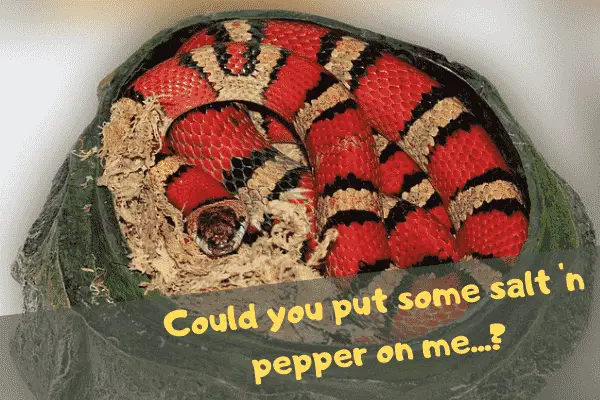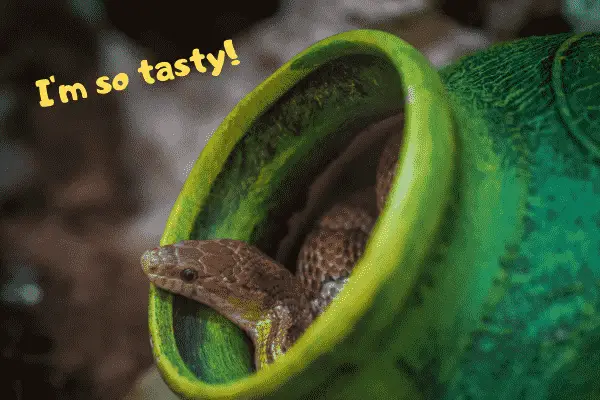When your snake bites itself, you may get a little worried. When you come home to find your snake eating its tail, it’s even worse! This article answers the question, “Why do snakes eat themselves?” We’ll also dive deeper into what you can do when your snake is eating itself, as well as what to do when your snake bites itself.
So, without further ado, let’s get into the post!

Table of Contents
Why do snakes eat themselves?
So, why do snakes eat themselves? This question is a little hard to answer. We can’t mind read, and asking the snake why it does what it does won’t result in any useful information. However, there are some theories that hold some weight. Some logical reasoning gets us very far too.
After doing some research on the topic, there’s a lot of evidence to support the temperature theory. If a snake gets overly hot, it’s thought that them eating themselves can happen as a result.
The exact reason for this is unknown, but a lot of people have managed to restore their snake’s peace by placing them in some cool water. Spraying cool water on the animal, as well as removing the heat source temporarily can also help.
Another reason why it is thought that snakes eat themselves is due to having a too small enclosure. It’s thought that snakes could confuse its tail with that of another snake. This especially seems to be the case for snakes which pray on other snakes.
If a snake is shedding, it may also attack itself. Since it can’t see very well, it may confuse itself with another snake which can cause them to lash out and try to eat their prey/intruder.
Exactly why snakes eat themselves is still a bit of a mystery. Not only that, but it’s also a rare thing. Luckily, it doesn’t happen as much in real life as you’re confronted with it on tv or online.
Fun fact: Did you know the symbol of a snake eating itself is often called Ouroboros. Ouroboros literally means “tail devourer” in ancient Greek.
Why do snakes bite themselves?
Why snakes bite themselves is a lot along the lines of why snakes eat themselves. If a snake confuses itself with an intruder or prey, it may lash out and bite itself. This can cause a whole host of problems of course if it’s your pet snake.
Another theory is that snakes will bite themselves when they are close to passing away. When a snake is on its last legs (no pun intended) it may start biting itself. This theory is supported by the fact that it’s often the older snakes that get caught portraying this behavior regularly.
As with a snake eating itself, why a snake bites itself is still a bit of a mystery. There are a few things you can do in both situations to prevent your snake from damaging itself any further though…
What to do when you catch your snake eating its tail
Should you ever walk into the room and see your snake eating itself, you probably experience quite the scare. However, it’s best to act quickly when this happens. Snakes can actually get stuck trying to swallow themselves. This article reports on a case where this happened.
Due to the fact that a lot of pet snakes, like ball pythons, are constrictors, they have backward pointed teeth. This prevents their pray from wriggling free. The more they try to pull out of the snake’s jaw, the firmer the grip becomes.
Unfortunately, this also means that the situation can get very damaging for the snake. Not only can the teeth sink in pretty deep, but the snakes tail can also actually get stuck in its mouth!
So, what should you do when you catch your snake eating its tail? Well, first asses the situation. Use your temperature gun to see if the enclosure is too hot. If it is, remove the heat source for a little while and mist the enclosure, as well as your snake, down. This will cool things off and hopefully cause your snake to release itself.
If it doesn’t, and you’re an experienced snake owner, you can gently try to get the snake to release itself. Be careful not to pull the teeth in deeper or cause any extra damage to the snake.
In most cases, the snake will release itself once cooled off.
If your snake is in an enclosure that’s too small, then move them to a larger setup. By doing these two things, your snake should stop trying to eat itself.
Don’t forget to find out what caused the enclosure to overheat if this was what caused it. You don’t want this same situation to happen again!

What to do when your snake bites itself
If your snake is biting itself, there are a few things you can do. For starters, check to see if you’re feeding them regularly enough and feeding them enough food. Also, check the husbandry that you’re providing for the snake.
Things like temperature, enclosure size and cleanliness can all cause issues with your snake. Is the enclosure in a calm place in the house or is it somewhere where your snake is constantly exposed to vibrations or other disturbances?
Usually, by checking these things you’ll soon be able to get your snake to stop biting itself. As we’ve already said, it’s hard to tell why snakes exhibit this kind of behavior. This means that trial and error on your part is key to solving it.
Like this post so far? We’ve got more answers to interesting snake-questions on our blog. Check out our post answering the question: Do snakes have tails?
Another interesting one is the question: Do all snakes lay eggs?
When to see a vet
If your snake draws blood, does it repeatedly, or you can’t get your snake to release itself, then visit your vet. We understand that you don’t want to visit your vet for every little thing here at Urban Reptiles, but it’s harmful to your snake if it keeps trying to eat itself.
If you’re worried about the health of your snake, it’s always best to take them to a vet. Posts on our blog shouldn’t be used as medical advice for your reptiles, it’s just information that has worked for other people.
Conclusion
Hopefully, you’ve learned a lot about why snakes eat themselves, as well as why they bite themselves. If you were struggling with a snake that was eating or biting itself, we hope that this article has helped you out, or you’ve been able to visit your vet to get your snake looked at.
Have we missed something in this article? Shoot us a message or leave a comment and let us know. We really appreciate any feedback we get about our website and are always looking to improve the resources we offer.
